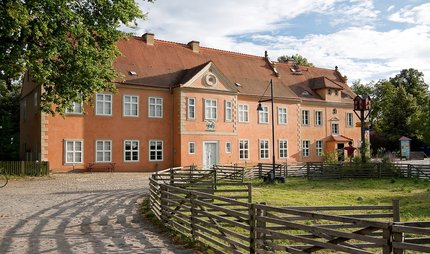
Museum Europäischer Kulturen (Museum of European Cultures)
Thrilling encounters await in the Museum Europäischer Kulturen
In the Museum of European Cultures you can immerse yourself in everyday cultures and lifestyles in Europe from the 18th century to the present day.
The collection of the Museum of European Cultures (MEK) offers a unique insight into European everyday culture and popular art with around 280,000 cultural-historical objects. The main focus is on encounters between people of different origins and the consequences of these contacts for society in the past and present. By collecting the present and working with different people and communities from all over Europe, the museum accompanies current social and cultural processes. Intercultural understanding should be encouraged and prejudices should be reduced.
A collection full of atmosphere
Many exhibits from the Museum Europäischer Kulturen come from the Museum für Volkskunde and from the Ethnologisches Museum. These collections are brought together in the Bruno-Paul building in Berlin-Dahlem in 1999. By 2011, the building is renovated and the exhibits are rearranged and given new descriptions. Upon entering the museum courtyard, take some time to enjoy the beauty of this historic building. Walk through the dark wooden doors into the foyer. On the ground floor, you will encounter the first highlight; a splendid Venetian gondola that stands grandly upon a pedestal. Opposite the gondola, some of Europe's many textiles are presented. Through clothing, you will get an insight into the everyday culture of centuries past. In the light from the windows, a wooden cart with magnificent pictorial motifs appears. The colourful vehicle was built for Emperor Wilhelm II on a trip to Sicily. In the hallway is the bright Corpus Christi altar of the Heinzelmann family from the 1920s. The best is a saved for last: in the dim light of the grand museum awaits the mechanical Christmas mountain, where 328 movable figures depict the most important scenes of the life of Jesus Christ. This exhibition is the result of a cultural exchange between Catholic Bohemia, the Protestant Saxon and the world of the Erzgebirge mountain workers.
Special features in the Museum Europäischer Kulturen
- Aids Memorial Quilt, Patchwork blanket as remembrance work (1988-2008)
- Mechanical Christmas mountain by Max Vogel (from 1885)
- Venetian gondola from 1910
- Döner replica used as outdoor advertising for snack bars (2003)
- Costume of a Light Mass participant (Spergau, 2011)
Highlights in the surrounding area
Southwest Berlin abounds in outstanding museums and exhibition centres, situated in an attractive natural and cultural landscape. Berlin's Green Museum Quarter offers leisure and education, history, recreation and creative inspiration like no other area in the city. Here you can find the most diverse institutions, displaying everything from ancient to modern art, from natural to cultural history. The institutions are open, living museums and exhibition venues, committed to a common idea: recreation between culture and nature.
The Domäne Dahlem is an open-air museum situated just 600m from the Museum Europäischer Kulturen. This ecological farm of agricultural and nutritional culture houses farm animals, right bang in the middle of Berlin. From here, walk for 30 minutes towards Grunewaldsee. There you will find the 16th century castle Jagdschloss Grunewald, built by Elector Joachim II. It is the oldest surviving building of its kind in Berlin.
Useful tips while visiting Museum Europäischer Kulturen
The best way to reach the museum is by underground (U3) or bus (M11, X83) via the stop Dahlem-Dorf. Those travelling by car can park in the Contipark Parkhaus Steglitzer Kreisel or in the Parkhaus APCOA. Although you are still half an hour from the museum, the route features a beautiful botanical garden. That's thirty minutes well spent in the lap of nature. Consider visiting the museum on the fourth Saturday of the month for a guided tour. The Museumspass Berlin gives you 3-day free entry to all National Museums in Berlin.
Opening hours
| Wednesday | |
|---|---|
| Thursday | |
| Friday | |
| Saturday | |
| Sunday |
Closed on Monday and Tuesday



